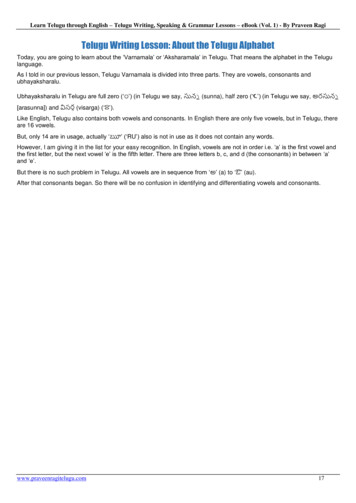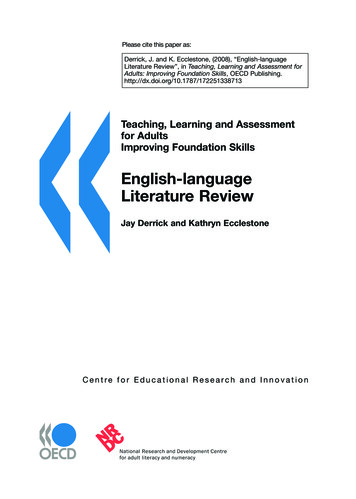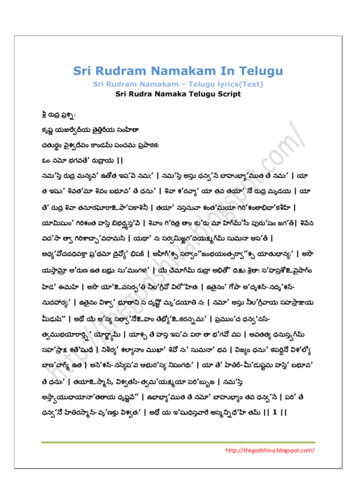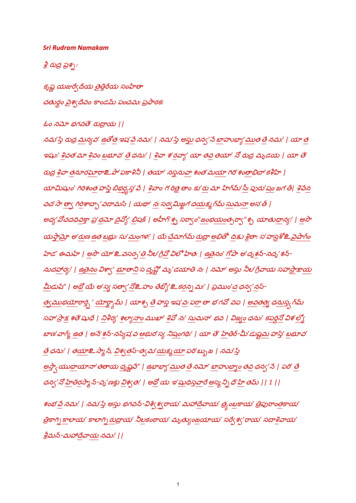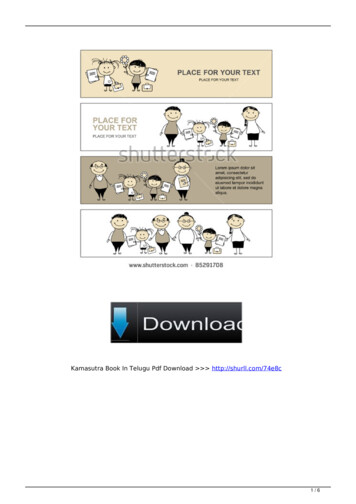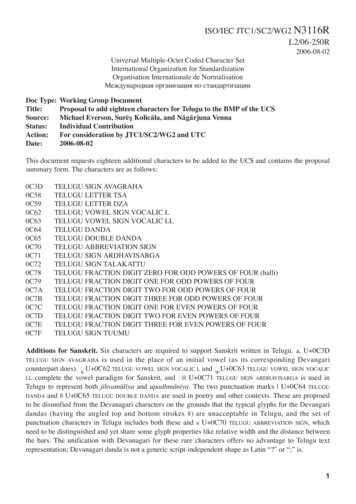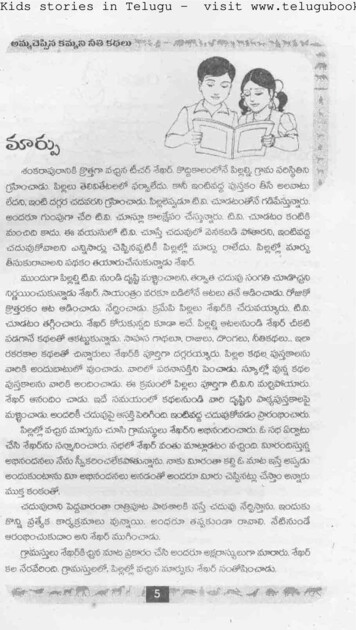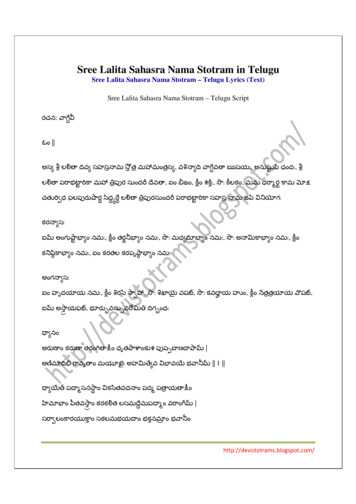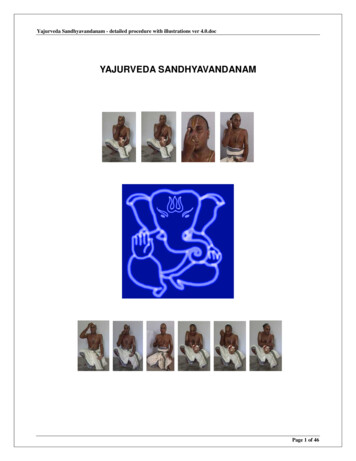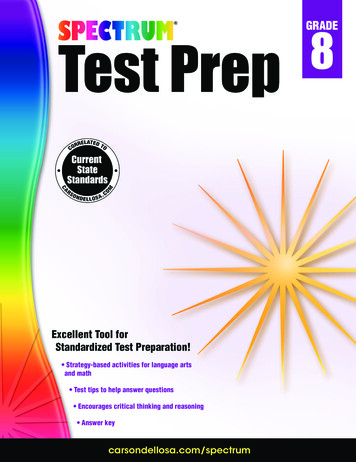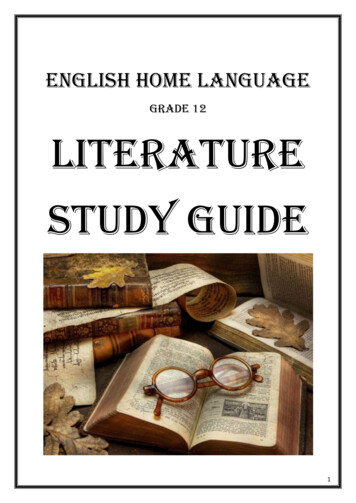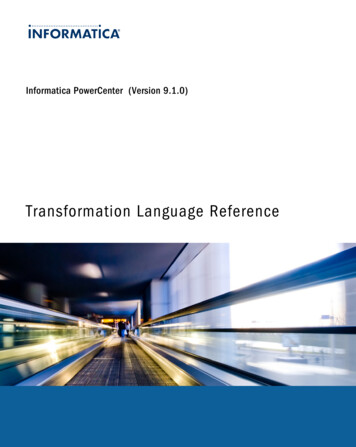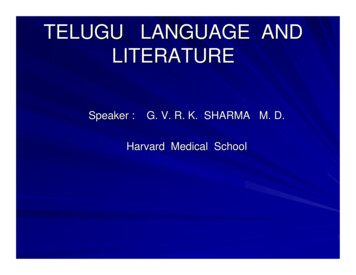
Transcription
TELUGU LANGUAGE ANDLITERATURESpeaker :G. V. R. K. SHARMA M. D.Harvard Medical School
TELUGULANGUAGEA classical language of IndiaAlso called ‘Andhra Bhaasha’Ranked 7th in Asia14th in the worldSpoken in the state of Andhra PradeshHarvard Outreach - Telugu2
Telugu Language : DemographyAlso spoken in the adjoining regions ofTamilnadu, Karnataka and Orissaand in the sizable diaspora populationsof Malaysia, Fiji Islands, U.K and U.STotal about 80 million peopleHarvard Outreach - Telugu3
Microsoft MapPoint and PlaneMad/WikipediaHarvard Outreach - Telugu4
Telugu Language :Unique feature(s)The only Indian language where every wordends in a vowel ( ‘AJANTA BHAASHA’ )Called ‘Italian of the East ‘ by Niccolo da Conti,a Venetian traveller of the 16th centuryHeavily Sanskritized ( close to 60%)Harvard Outreach - Telugu5
Telugu Language : OriginsAn Indo – Dravidian off-shootDeveloped after Tamil and KannadaRock- edicts and inscriptions dating backto 1st century A.D.Present literary form around 900 A.D.Harvard Outreach - Telugu6
Telugu LiteratureNannaya was the first poet ( ‘Adikavi’)Shaped poetic format (‘vaaganusasana’)Wrote the first 3 canto’s of MahabharataTrend-setter for all subsequent poetsWords mainly Sanskrit-derived (‘tatsama’)Harvard Outreach - Telugu7
Telugu LiteratureAn example of Nannaya’s poetry :“The moon-lit autumn nights were lovely;the bright chains of stars in the cloudlessskies made them lovelier. Replete with thescent of water-lilies wafted by gentlebreezes, the nights were luminescent withmoonlight scattered like camphor-dust.”Harvard Outreach - Telugu8
Telugu LiteratureTikkana, an administrator, warrior, poetCompleted Mahabharata(11th century A.D)Blazed a new trail using a judicious mix ofSanskrit- derived and indigenous words( Accha Telugu)Brought Telugu poetry closer to the publicHarvard Outreach - Telugu9
Telugu literature : ThikkanaA sample of Thikkana’s poetry:This is a 4-line verse called ‘kanda padyam’(a meter not borrowed from Sanskrit),for which Thikkana is famous :“ The arrows that have pierced your bodycan be removed and the wounds healed,but the words that have caused deep hurtcannot be removed by any means”Harvard Outreach - Telugu10
Telugu LiteratureLanguage of literary Telugu(Grandhika orSampradayika) has been different from itsspoken( vyavaharika) formThe words, the meter and the contentsmostly originated from SanskritHarvard Outreach - Telugu11
Telugu LiteratureOther poets followed in the foot-steps ofNannaya and ThikkanaNanne Choda, Yerrapreggada, NachanaSomana, Srinadha, Gaurana and Potana( 11th to 15th century A.D.)All outstanding poets, they set the stagefor the golden age of Telugu literatureHarvard Outreach - Telugu12
Telugu Literature : the golden ageOf Andhra history in general, and theliterature, in particular ( Vijayanagaraempire of Krishnadevaraya : 16th century )Glowing accounts of Portuguese historiansDomingo Paes and Fernao NunizHarvard Outreach - Telugu13
Telugu Literature : the golden ageFull flowering of poetry with stalwarts likePeddana, (‘Andhra Kavita Pitamaha’meaning ‘Father of Telugu Poetry’),who wrote “Manu charitra”Pingali Surana (author of the first originalkavya (classic) ‘Kalapoornodayamu’) andDvyardhi kavya, ‘RaghavaPandaveeyamu’ with each poem giving 2meanings suitable for both Ramayanaand Mahabharata – a rare scholastic featHarvard Outreach - Telugu14
Telugu literature : golden age“It is difficult to compose a poemwith two meanings; if the entire workis like that, is it not extra-ordinaryscholarship? That too, in Telugu,which is wonderful! Who is there(other than me), that can combineRamayana and Mahabharata (into one)!Harvard Outreach - Telugu15
Telugu Literature : the golden ageOther esteemed poets : Timmana( authorof ‘Parijatapaharanamu’), and Dhurjati(author of ‘Kalahasti Mahatmyamu’)Emperor Krishnadevaraya himself was agreat scholar ( author of ‘Amuktamalyada’,one of 5 best classics, ‘Pancha Kavyas’)Considered Telugu as the best of Indianlanguages ( ‘Desa Bhaashalandu .Lessa’)Harvard Outreach - Telugu16
Telugu Literature : the golden ageBhattu Moorthy ( ‘Ramaraja Bhooshana’) :author of ‘Vasu Charitra’,excelled in ‘slesha’( pun) and metrical compositionTenali Ramakrishna : renowned for hisready wit and choice of words, wrote‘Panduranga Mahatmyamu’, a classicHarvard Outreach - Telugu17
After Vijayanagara empire (1336-1646 a.d)patronage shifted to Tanjavur (Nayaka’s)Quality declined, most of the output a poorimitation of earlier worksVemana of 18th century, a welcomechange from the traditionHarvard Outreach - Telugu18
Telugu literature : break from pastVemana, a social and religious rebel, usedsimple poetry to convey his messageThe meter he chose was ‘AaTaveladi’, aquartet-meter he handled with felicityNo poetic embellishments or scholasticdisplay ; easily understood & rememberedSo popular, every Andhra can reciteat least a few of his hundreds of versesHarvard Outreach - Telugu19
Telugu Literature : VemanaA sample of Vemana’s poetry:“People may boast of pedigree or caste,They may be arrogant with education,But all are slaves to the rich ““Why provide colorful dress to the idol,Bowlfuls of food and fabulous temples?Does God want food, clothing and shelter?”Harvard Outreach - Telugu20
Telugu Literature: break from pastGurajada Apparao & Gidugu Ramamurtychampioned the cause of spoken TeluguGurajada’s ‘Kanyasulkam’, a play in whichspoken Telugu is used with telling effectGidugu silenced orthodox classicists withhis writings & speeches; made way forspoken(vyavaharika) Telugu as a validand preferable literary mediumHarvard Outreach - Telugu21
Telugu Literature: break from pastClassical era retreated, but with a flourish.Viswanadha Satyanarayana, a colossalliterary figure with a wide range of works inclassical genre, received the Jnanpeethaward for his ‘Ramayana kalpavrikshamu’Devulapalli Krishnasastry’s‘Krishnapakshamu-Urvasi’ stands out aslyrical romantic poetry (‘Bhavakavitvamu’)Harvard Outreach - Telugu22
Telugu Literature: the modern eraSri Sri, short for Srirangam Srinivasa Rao,hailed as the harbinger of modern poetry(‘Navayugavaitalika’, 1911-1983)‘Mahaprasthanam’ an anthology in blankand rhythmic verse, employed spokenTelugu, addressed the plight of thecommon man and set the tone for allmodern telugu poetryHarvard Outreach - Telugu23
Telugu Literature : poetry of Sri. Sri“When you look at the history of nationsWhat is there to be proud of ?The entire history of mankindIs one of oppression and exploitation”“The strong subjugated the weak,Murderers became emperorsand made a name for themselves;No place where a battle hasn’t been foughtThe past is drenched in blood or sweat”Harvard Outreach - Telugu24
Telugu literature: ProseMost literature, till the advent of modern era, wasa combination of poetry & prose (called‘champu’) in classical Telugu‘Pure’ prose, in the form of novels, essays orshort stories began only in 19th centuryGurajada, the advocate of spoken Telugu, wroteexemplary short stories ( in addition to the play‘Kanyasulkam’ and poems in ‘Matrachandassu’)Harvard Outreach - Telugu25
Telugu Literature : ProseGudipati Venkatachalam (‘Chalam’) railedagainst orthodox practices in the societyand espoused the cause of women in hisnovels and storiesKodavatiganti Kutumbarao (‘ko. ku’), aprolific writer whose stories and essaysgave an expose’ of the middle classChaganti Somayajulu (‘Cha. So.’): masterof the short-story with the proper idiomHarvard Outreach - Telugu26
Telugu Literature : ProseRachakonda Viswanadha ( Ra. Vi.) Sastryconsidered the most powerful writer, bothin terms of the language and the message( hence called “Sri Sri’ in prose”)Wrote mostly in the north-eastern dialect(Visaakha MaanDalikam) highlighting theplight of the lower classes. His novels :‘Alpa jeevi’, ‘Rattalu-Rambabu’ & moreHarvard Outreach - Telugu27
Telugu literature : recent celebritiesC.Narayana Reddy ( ci.na.re): writer of widerange who balanced the traditional with themodern; 2nd Jnaan Peeth awardeeDevarakonda Balagangadhara Tilak : noted forsensitive lyrical blank verse(‘Amritam kurisina raatri’, a lovely anthology)Other note-worthy writers : Gunturu SeshendraSarma, ‘Ajanta’ ( Penumarti ViswanadhaSastry), ’Digambara poets’,Boyi Bheemanna, Mohanaprasad ( ‘Mo’)Harvard Outreach - Telugu28
Telugu literature : recent trendsFeminist poetry : Problems of womenin the society addressed without inhibitionSavitri ( 1949-’91, ‘Dacoits’, ‘Housewife’)Kondepudi Nirmala,( ‘Labour Room’, ‘ThadisiMopedaina katha’) describing thetravails of women during child-birthJayaprabha : asking women to rebel againstconventional morality (‘chintala nemali’, ‘Paita’)Harvard Outreach - Telugu29
Telugu literature : current trends‘Dalit’: literature of the oppressedAddressing untouchability, child laborpolitical exploitation, Naxalite movementDoes not employ classical language or meterFree use of slangNoteworthy writers:Endloori Sudhakar ‘vartamaanam’( the present)Sivasagar : ‘NaDustunna charitra’ (the currenthistory)Khader Mohiuddin: ‘PuTTu maccha’ ( mole)Darise Sesi Nirmala : ‘Dalituralu’ (theoppressed woman)30Harvard Outreach - Telugu
Telugu : AvadhanamuLiterary feat known in SanskritCurrently in Telugu and KannadaA test of the powers of memory, readyversification and the ability to performmultiple tasks simultaneouslyDepending on the number of tasks, it’s an‘Ashtavadhanam’(eight), ‘Satavadhanam’(hundred), ‘Sahasravadhanam’ (thousand)Harvard Outreach - Telugu31
Telugu : Avadhanamone who performs is ‘Avadhani’one who tests is ‘Pricchaka’(questioner)Questions are literary and demand promptversification observing rules of prosodyRestrictions are placed re: use of certainsyllables or letters in specific locationsThe topic of the question, the meter andother constraints may vary for each verseHarvard Outreach - Telugu32
Telugu : ashtavadhanamuThe avadhani is not allowed to versify allfour lines at a stretch; after the first line isdone, the 2nd pricchaka comes up with hisquestion to which the avadhani respondsin verse with a new line, moves on to the3rd, and so on till all (8) questioners aresatisfied. The avadhani then recites all thefirst lines of the 8, does the 2nd line of eachverse in a similar manner (round-robin) tillall four lines of each verse are done.Harvard Outreach - Telugu33
Telugu : ashtavadhanamuDuring the versification, which is the maintest, one of the questioners may keepringing a bell and the avadhani has tokeep track of the number of bell-ringsAttention may be diverted by a ‘pricchaka’who intervenes at random with irrelevant(‘aprastuta’) queries that the avadhani hasto answer with ready wit or reparteeHarvard Outreach - Telugu34
Telugu : avadhanamuAt the end, the avadhani will have to recitethe 4 lines of the verse intended for each‘pricchaka’ in proper sequence ( havingobserved all the prescribed restrictions),respond properly to the ‘aprastuta’( irrelevant) questions and give anaccurate tally of the bell-rings!The more the # questioners, the greaterthe challenge and the greater the credit.Harvard Outreach - Telugu35
Telugu : avadhanamuIn the modern era Divakarla Tirupati Sastri andChellapilla Venkata Sastri ( ‘Tirupati VenkataKavulu’), in addition to being well-known playwrights, are the most famous avadhanis whoseprowess is legendaryCurrent avadhanis are many: MadugulaNagaphani Sarma, Medasani Mohan, GarikipatiNarasimharao, Rallabandi Kavitaprasad andmany others who have performed ashta, sata,sahasra, and dvisahasra avadhanamsHarvard Outreach - Telugu36
Telugu script, grammar andprosodyThe script is close to KannadaVowels ( ‘Acchulu’):అ ఆ ఇ ఈ ఉ ఊ ఋ ౠ ఎ ఏ ఐ ఒ ఓ ఔ అంఅ ఃConsonants( ‘Hallulu’) ళHarvard Outreach - Telugu37
Telugu GrammarDerived from Sanskrit (‘Tatsama’) e.g.’simha’Modified ( ‘Tadbhava’) e.g.’singamu’‘Desya’ : regional ( ‘Accha Telugu’)‘Gramya’ : also regional, but slangCase of the nouns by adding suffix or prefixడ4 మ5 వ6 ల7 etc. according to the casee.g., ‘nannu’, ‘neetho’, ‘meeku’ etc.Harvard Outreach - Telugu38
Telugu GrammarGender( ‘linga’)‘Mahat(‘pum’) : male;‘Mahati’(‘stree’): female;‘amahat’(‘napumsaka’): neuterNumber(‘vachana) : a’): as in English‘Sandhi’ : joining 2 wordse.g., ‘meeru’ ’evaru’ ‘meerevaru’ (‘who are you?’)Harvard Outreach - Telugu39
Telugu Prosody( ‘chandassu’)Meters from Sanskrit with minor changesUtpalamala, champakamala, mattebha,Sardoola, sragdhara, bhujangaprayata etc.Meters indigenous:Seesa, kanda, aaTaveladi, ThETageethi etcThe rules require arrangement of letters in auniform manner with rhyming of the 1st letterof each line with another letter of specific location( yati and praasa)Harvard Outreach - Telugu40
Telugu ‘Chandassu’ (‘Desi’)Meters constructed, not based on lettersbut on groups of syllables; verses are notas rigid as the Sanskrit-derived meters-‘ShaTpadi (from Kannada), RagaDa,Mutyaalasaram( popularized by Gurazada,Rayaprolu Subbarao and Sri. Sri.), e.g.,‘DesamanTe maTTikaadoy( A country is not a piece of land)DesamanTe manushuloy’( A country is its people)Harvard Outreach - Telugu41
Telugu prosody : current statusMost of the current poetry is ‘ Free Verse’(‘vachana Kavita’), feasible for anyone, orBlank Verse( ‘geya kavita’) which requiressome command of the languageVery little is in the form of ‘Desi chandassu’)and even less in the form of rigid metersbecause they require sound knowledge ofthe language, the grammar and prosodyHarvard Outreach - Telugu42
Telugu : contribution to musicIn Karnatic ( South Indian classical) musica vast majority of compositions – kirtanas,varnams, padams, javalis, thillanas – arein Telugu. Many vaggeyakaras (composers)enriched the Sastra (science), sampradaya(tradition) and Sahitya (literature) of music(already in vogue) by their devotional a
Harvard Outreach - Telugu 33 Telugu : ashtavadhanamu The avadhani is not allowed to versify all four lines at a stretch; after the first line is done, the 2 nd pricchaka comes up with his question to which the avadhani responds in verse with a new line, moves on to the 3rd, and so on till all (8) questioners are satisfied. The avadhani then recites all theFile Size: 534KBPage Count: 54
